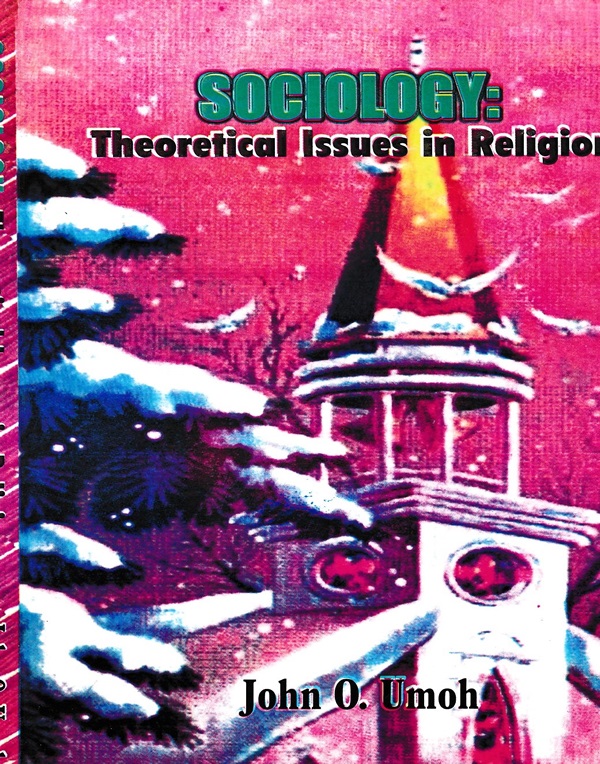Description
ABOUT
The text, SOCIOLOGY: Theoretical Issues in
Religion, is written from the points of view of both
sociology and religion. It is also a book on theory
because it examines those ideas and, concepts
which have guided scholarly research and
generated conclusions in the above mentioned
areas of study as important parts of the social
science family.
Specifically, the book examines the
interaction between religion as a social institution
and selected secularized institutional surrogates,
with an analysis of the implication of the interaction
for the social system. The book is intended for both
the general reader and the academic because of its
ability to provide a theoretical approach and.
appreciation to the phenomenon of religion and its
importance to the human society.
PREFACE
This book focuses on issues in the sociology of
religion. It is also a book about theory. Theory in the scientific
sense means a body of ideas and concepts, which delineate
an area of study in terms of both research problems and
generalized conclusions. A conceptual scheme and simple
scientific vocabulary of analysis devoid of the usual
sociological and technical jargons have guided the
discussions presented in the various chapters.
When conceptualized as scientific theory, which
provides a necessary frame of reference for intellectual
debate and research, the field of the sociology of religion can
be quite fascinating and impressive. The book presents the
insights and contributions of numerous scholars, both
classical and contemporary, on the topics discussed while at
the same time attempting to reinforce those issues with their
day-to-day practical relevance. Certain authors, like Emile
Dukheim and Max Weber, will be seen to feature more
prominently and frequently than others. This is so, not so
much because of their positions as early pioneers in the field,
but because of their holistic and comprehensive approach to
sociology as a discipline and sociology of religion in
particular. In some instances, they are merely appealed to as
frames of reference, whose contributions have withstood the
best of time.
In a rather technical sense, the sociology of religion is
but one aspect of the study of the relationship between ideas,
which are embodied in movements and institutions, and the
social conditions of their origin, development, growth and
decline. The significant analogies between religion and such
secularized religious surrogates as culture, social change,
magic and conflict, among others have received extensive
attention throughout the book while the religious and
humanistic traditions from which the claimed relationships
derive have served as intellectual and methodological
apogees. The last chapter on Some Issues in the Sociology
of Religion, which outlines certain problem areas in the field,
is added in orderto generate discussions and more research
work in the field
In terms of its worth and relevance, SOCIOLOGY:
theoretical issues in religion, is meant to provide both the
general reader and the academic with a brief presentation of
the sociological approach to an interpretation of the religious
phenomenon. By so doing, the reader is offered an important
avenue for appreciating the human and social significance of
religion.
TABLE OF CONTENT
- Chapter One:
Introduction.
- Chapter Two:
The Religious and Humanistic Traditions
- Chapter Three:
Religion And The Sociological Discipline
- Chapter Four:
- Theories of Religion
- Psycological Theories of Religion
- Sociological Theon’es of Religion
- Anthroplogical Theories of Religion
- Chapter Five:
Religion and Psychiatry
- Chapter Six:
Religion and Magic
- Chapter Seven:
The Secularizarion of Religion
- Chapter Eight
- Religion and Secret Cult
- What is a Secret Society?
- Secret Cult and Secret Society:
- Secret Cult:
- Proposed strategies for the control of secret cult in society
- Chapter Nine
- Pentecostalistic Religions
- The Meaning of Pentecostalism
- Origin of Penteoostlism
- Pentecostalism and Society
-
Chapter Ten
- Functionalist and Marxist Perspectives of Religion
- Contemporary Functionalist Perspectives of Religion
- Contemporary Marxist Perspectives of Religion
- Chapter Eleven
- Religion and Culture
- God as a Supreme Being
- African Traditional Cosmology.
- The Conception of Man
- Human Life
- Prayer
- Sacred and Profane Objects and Places.
-
ChapterTwelve
- Religion and Social Change
- Max Weber: Religion and Social Change
- Karl Marx: Religion and Social Change
- Emile Durkheim: Religion and Social Change
-
ChapterThirteen:
Religious Conflict
- Chapter Fourteen:
Some Issues in The Sociology of Religion
Conclusion
Bibliography
Questions and Answers
You are not logged in
